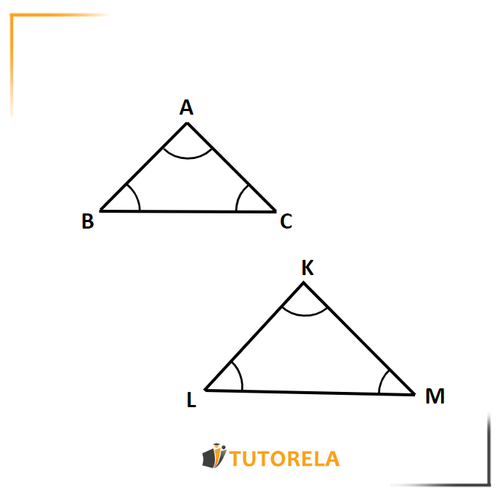The similarity ratio is the constant difference between the corresponding sides of the two shapes.
That is, if the similarity ratio is , we know that each side of the large triangle is times larger than that of the small triangle.
Similarity Ratio Practice Problems with Step-by-Step Solutions
Master similarity ratios with guided practice problems. Learn to calculate ratios between corresponding sides of similar triangles and polygons through examples.
- Calculate similarity ratios by dividing corresponding sides of similar figures
- Identify corresponding sides in similar triangles and polygons accurately
- Apply the four-step method to find similarity ratios systematically
- Solve real-world problems involving similar shapes and scale factors
- Distinguish between similarity ratios and congruent figure relationships
- Work with fractional and decimal similarity ratios confidently
Understanding The Ratio of Similarity
What is the similarity ratio?
How do we calculate the similarity ratio?
The calculation of the similarity ratio is divided into several steps that must be performed:
- First we must know that we are dealing with similar triangles or polygons.
- We must know how to identify the corresponding sides in each of the triangles or polygons.
- We need to know the sizes of a pair of equal sides.
- We must divide the size of one side by the size of the other side.
The result obtained is actually the similarity ratio.

Practice The Ratio of Similarity
Triangles ADE and ABC are similar.
Choose the correct answer.
Examples with solutions for The Ratio of Similarity
Is the similarity ratio between the three triangles equal to one?
To answer the question, we first need to understand what "similarity ratio" means.
In similar triangles, the ratio between the sides is constant.
In the statement, we do not have data on any of the sides.
However, a similarity ratio of 1 means that the sides are exactly the same size.
That is, the triangles are not only similar but also congruent.
In the drawing, you can clearly see that the triangles are of different sizes and, therefore, clearly the similarity ratio between them is not 1.
Answer:
No
BC is parallel to DE.
Fill in the gap:
Since we are given that line BC is parallel to DE
Angle E equals angle C and angle D equals angle B - corresponding angles between parallel lines are equal.
Now let's observe that angle D is opposite to side AE and angle B is opposite to side AC, meaning:
Now let's observe that angle E is opposite to side AD and angle C is opposite to side AB, meaning:
Answer:
AB
According to which theorem are the triangles similar?
What is their ratio of similarity?
Using the given data, the side ratios can be written as follows:
We can therefore deduce that the ratio is compatible with the S.S.S theorem (Side-Side-Side):
Answer:
S.S.S.,
Triangle DFE is similar to triangle ABC.
Calculate the length of FE.
Let's look at the order of letters of the triangles that match each other and see the ratio of the sides.
We will write accordingly:
Triangle ABC is similar to triangle DFE
The order of similarity ratio will be:
Now let's insert the existing data we have in the diagram:
Let's reduce y and we get:
Answer:
Choose the correct answer.
First, let's look at angles C and E, which are equal to 30 degrees.
Angle C is opposite side AB and angle E is opposite side BD.
Now let's look at angle B, which is equal to 90 degrees in both triangles.
In triangle ABC the opposite side is AC and in triangle EBD the opposite side is ED.
Let's look at angles A and D, which are equal to 60 degrees.
Angle A is the opposite side of CB, angle D is the opposite side of EB
Therefore, from this it can be deduced that:
And also:
Answer:
Answers a + b are correct.